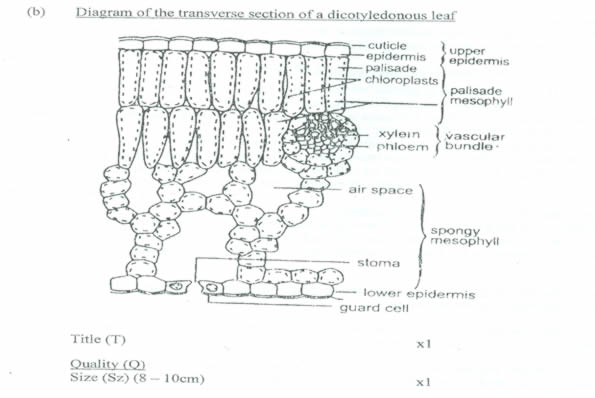Question 2
- Write a balanced chemical equation for the process of photosynthesis. [4 marks]
- Make a drawing 8cm – 10cm long of the transverse section of a dicotyledonous leaf and label fully. [11 marks]
- State five functions of a mammalian liver. [5 marks]
Observation
Candidates could not write a well balanced chemical equation for photosynthesis and majority
could not also draw T.S of a dicotyledonous leaf but drew a dicotyledonous leaf. The few candidates that tried to draw wrongly labelled the parts or did not label the parts properly with spelling errors.
For question 2 (c), majority could not give up to three functions of the liver out of the five required.
The expected answer are:
(a) Chemical equation of photosynthesis
6C02+6H2O Chlorophyll C6H12O6+6O2
![]() Sunlight
Sunlight
correct reactant (CR) x 1
correct product (CP) x 1
correct condition (CC) x 1
balancing (BL) x 1
(b) Diagram of the transverse section of a dicotyledonous leaf

Title (T) x1
Quality (Q)
Size (Sz) (8 – 10cm) x1
Clarity of lines (CL) x1
Neatness of labels (NL) x1
Details (D)
Upper epidermis with cuticle layer shown (EC) x 1
Spongy mesophyll with irregular cells (SI) x 1
Palisade mesophyll longitudinally packed cells (PP) x 1
Labels (L)
Cuticle; upper epidermis/epidermal cell; palisade mesophyll; spongy mesophyll; vein/vascular bundle/tissue; xylem vessel; phloem vessel; intercellular airspace; stoma; guard cell; chloroplast; lower epidermis/epidermal cell.
(c) Functions of the mammalian liver
- carbohydrate/protein/fat metabolism; - deamination of excess amino acids;
- production of bile; - manufacture of foetal red blood cells;
- protein synthesis; - manufactures fibrinogen for blood clotting;
- iron storage/potassium/copper/minerals; - heat production;
- detoxification; - storage of vitamins B12, A, D;
- conversion of blood glucose to glycogen
- and vice versa/regulation of blood sugar; - removal of cholesterol from the blood;
- blood storage; - elimination of sex hormones after functioning;
- elimination of haemoglobin from used RBC; - Any other correctly named functions.
